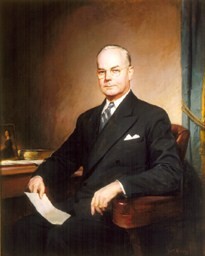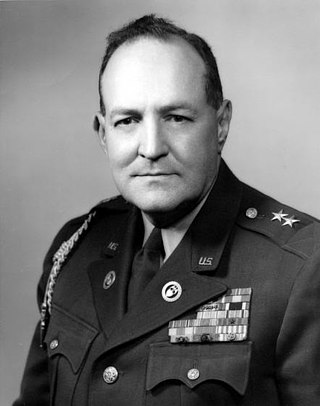
The 1944 United States presidential election was the 40th quadrennial presidential election. It was held on Tuesday, November 7, 1944. The election took place during World War II, which ended the following year. Incumbent Democratic President Franklin D. Roosevelt defeated Republican Thomas E. Dewey to win an unprecedented fourth term. It was also the fifth presidential election in which both major party candidates were registered in the same home state; the others have been in 1860, 1904, 1920, 1940, and 2016.

John Lewis Gaddis is an American international relations scholar, military historian, and writer. He is the Robert A. Lovett Professor of Military and Naval History at Yale University. He is best known for his work on the Cold War and grand strategy, and he has been hailed as the "Dean of Cold War Historians" by The New York Times. Gaddis is also the official biographer of the seminal 20th-century American statesman George F. Kennan. George F. Kennan: An American Life (2011), his biography of Kennan, won the 2012 Pulitzer Prize for Biography or Autobiography.
The Fair Deal was a set of proposals put forward by U.S. President Harry S. Truman to Congress in 1945 and in his January 1949 State of the Union address. More generally, the term characterizes the entire domestic agenda of the Truman administration, from 1945 to 1953. It offered new proposals to continue New Deal liberalism, but with a conservative coalition controlling Congress, only a few of its major initiatives became law and then only if they had considerable GOP support. As Richard Neustadt concludes, the most important proposals were aid to education, national health insurance, the Fair Employment Practices Commission, and repeal of the Taft–Hartley Act. They were all debated at length, then voted down. Nevertheless, enough smaller and less controversial items passed that liberals could claim some success.

John Wesley Snyder was an American businessman and senior federal government official. Thanks to a close personal friendship with President Harry S Truman, Snyder became Secretary of the Treasury in the Truman administration. He is the first native-born Arkansan to hold a US Cabinet post. Historian Alonzo Hamby emphasizes Snyder's conservatism, stating that he was openly skeptical of New Dealism, broad-gauged social programs, and intellectuals who believed the economy could be run from Washington.

Harry S. Truman was the 33rd president of the United States, serving from 1945 to 1953. A leader of the Democratic Party, he previously served as the 34th vice president from January to April 1945 under Franklin Roosevelt and as a United States senator from Missouri from 1935 to January 1945. Assuming the presidency after Roosevelt's death, Truman implemented the Marshall Plan to rebuild the economy of Western Europe and established both the Truman Doctrine and NATO to contain the expansion of Soviet communism. He proposed numerous liberal domestic reforms, but few were enacted by the conservative coalition that dominated the Congress.
The President's Committee on Civil Rights was a United States presidential commission established by President Harry Truman in 1946. The committee was created by Executive Order 9808 on December 5, 1946, and instructed to investigate the status of civil rights in the country and propose measures to strengthen and protect them. After the committee submitted a report of its findings to President Truman, it disbanded in December 1947.
Modern liberalism in the United States, often simply referred to in the United States as liberalism, is a form of social liberalism found in American politics. It combines ideas of civil liberty and equality with support for social justice and a well-regulated mixed economy. Modern liberalism generally opposes the interests of corporations, opposes cuts to the social safety net, and supports a role for government in reducing inequality, increasing diversity, providing education, ensuring access to healthcare, regulating economic activity, and protecting the natural environment. This form of liberalism took shape in the 20th century as the voting franchise and other civil rights were extended to a larger class of citizens, most notably among African Americans and women. Major examples of modern liberal policy programs include the New Deal, the Fair Deal, the New Frontier, the Great Society, and the Affordable Care Act.
Louis Filler was a Russian Empire-born American teacher and a widely published scholar specializing in American studies.

The Fifth Party System is the era of American national politics that began with the New Deal in 1932 under President Franklin D. Roosevelt. This era of Democratic Party-dominance emerged from the realignment of the voting blocs and interest groups supporting the Democratic Party into the New Deal coalition. Following the Great Depression, most black voters switched from the GOP to the Democratic Party, and some conservative, white southern Democrats shifted to the Republican Party as the Democratic party became known as the party of civil rights; this process accelerated in the 1960s and 1970s. For this reason, it is often called the "New Deal Party System". It followed the Fourth Party System, usually called the Progressive Era, and was followed by the Sixth Party System. However, there is a dispute about when the Sixth Party System began.
Cold War liberal is a term that was used in the United States during the Cold War, which began after the end of World War II. The term was used to describe liberal politicians and labor union leaders who supported democracy and equality. They supported the growth of labor unions, the Civil Rights Movement, and the War on Poverty and simultaneously opposing totalitarianism commonly seen under Communist rule at the time. Cold War liberals supported efforts to contain Soviet communism.
Ellen Wolf Schrecker is an American professor emerita of American history at Yeshiva University. She has received the Frederick Ewen Academic Freedom Fellowship at the Tamiment Library at NYU. She is known primarily for her work in the history of McCarthyism. Historian Ronald Radosh has described her as "the dean of the anti-anti-Communist historians."
Liberalism in the United States is a political and moral philosophy based on concepts of unalienable rights of the individual. The fundamental liberal ideals of freedom of speech, freedom of the press, freedom of religion, the separation of church and state, the right to due process and equality under the law are widely accepted as a common foundation of liberalism. It differs from liberalism worldwide because the United States has never had a resident hereditary aristocracy and avoided much of the class warfare that characterized Europe. According to Ian Adams: "Ideologically, all US parties are liberal and always have been. Essentially they espouse classical liberalism, that is a form of democratised Whig constitutionalism plus the free market. The point of difference comes with the influence of social liberalism" and the proper role of government.
Robert Hugh Ferrell was an American historian and a prolific author or editor of more than 60 books on a wide range of topics, including the U.S. presidency, World War I, and U.S. foreign policy and diplomacy. One of the country's leading historians, Ferrell was widely considered the preeminent authority on the administration of Harry S. Truman, and also wrote books about half a dozen other 20th-century presidents. He was thought by many in the field to be the "dean of American diplomatic historians", a title he disavowed.

This bibliography of Harry S. Truman is a selective list of scholarly works about Harry S. Truman, the thirty-third president of the United States (1945–1953). See also the bibliographies at Harry S. Truman, Presidency of Harry S. Truman, and Foreign policy of the Harry S. Truman administration.

Harry S. Truman's tenure as the 33rd president of the United States began on April 12, 1945, upon the death of Franklin D. Roosevelt, and ended on January 20, 1953. He had been vice president for only 82 days. A Democrat from Missouri, he ran for and won a full four–year term in the 1948 election. Although exempted from the newly ratified Twenty-second Amendment, Truman did not run again in the 1952 election because of his low popularity. He was succeeded by Republican Dwight D. Eisenhower in 1953.
William Edward Leuchtenburg is an American historian. He is the William Rand Kenan Jr. Professor Emeritus of History at the University of North Carolina at Chapel Hill, and a leading scholar of the life and career of Franklin Delano Roosevelt.

During his two terms in office, President Harry S. Truman appointed four members of the Supreme Court of the United States: Chief Justice Fred M. Vinson, Associate Justice Harold Burton, Associate Justice Tom C. Clark, and Associate Justice Sherman Minton.

Major General Harry Hawkins Vaughan was a senior officer in the United States Army Reserve and a military aide to Harry S. Truman during his time as vice president (1945) and president. He was one of Truman's closest advisors.

Off the Record: The Private Papers of Harry S. Truman is a 1980 book edited by historian Robert Hugh Ferrell which collects writings and correspondence by Truman, the 33rd U.S. president, between 1945 and 1971. Historian Donald R. McCoy, writing in Presidential Studies Quarterly, called it a work of "great scholarly value … which is easily one of the most important and interesting books dealing with the recent Presidency published during the past decade."

Choosing Truman: The Democratic Convention of 1944 is a 1994 book by historian Robert Hugh Ferrell about the political convention in Chicago which nominated Franklin D. Roosevelt for his fourth election to the U.S. presidency, but jettisoned Vice President Henry A. Wallace in favor of Missouri Sen. Harry S. Truman. The choice was particularly significant because Roosevelt would die in office the following year, making Truman the 33rd president.








